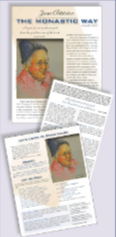A month of contemplation
The signal is clear: There is no time to sink into the quiet of fall that is promised with the coming of Thanksgiving. By the Friday morning  that follows it, the raucousness of capitalist Christmas bursts suddenly upon us. The warning of autumn, with its browning of leaves and graying of skies, that life too, is susceptible to the wisdom of the seasons gets lost in the plastic world of limitless desire and limited resources. Shopping becomes what Advent is meant to be: the consuming preparation for one of the greatest feasts of the Christian year.
that follows it, the raucousness of capitalist Christmas bursts suddenly upon us. The warning of autumn, with its browning of leaves and graying of skies, that life too, is susceptible to the wisdom of the seasons gets lost in the plastic world of limitless desire and limited resources. Shopping becomes what Advent is meant to be: the consuming preparation for one of the greatest feasts of the Christian year.
But commercialism is not the problem. We’re a consumer society whatever the season. The problem is that the lack of contemplative consideration that comes with Christmas consumerism too often drowns out the sounds of Advent and drains not only the feast but even, perhaps, the rest of the year of its meaning.
As a result we have managed to make Christmas an event, a passing fancy, an exhausting endurance exercise, stripped of reflection by the pressure of social protocols. But judging from the scripture of the season, Christmas is surely meant to be an attitude toward life, not a carnival. It is meant to be arrived at slowly and lived succulently. Christmas is not meant to be simply a day of celebration; it is meant to be a month of contemplation. But because Advent has been lost somewhere between the Thanksgiving turkey and pre-Christmas sales, we have lost one of the richest seasons of the year.
Advent is an excursion through Scripture meant to give depth and emotional stability to the days for which there are no songs, no tinsel, no flashing lights to distract us from its raw, tart marrow. Unless we can reclaim Advent, the lack of it will show dearly in the way we go through the rest of life itself.
—from The Monastic Way by Joan Chittister
